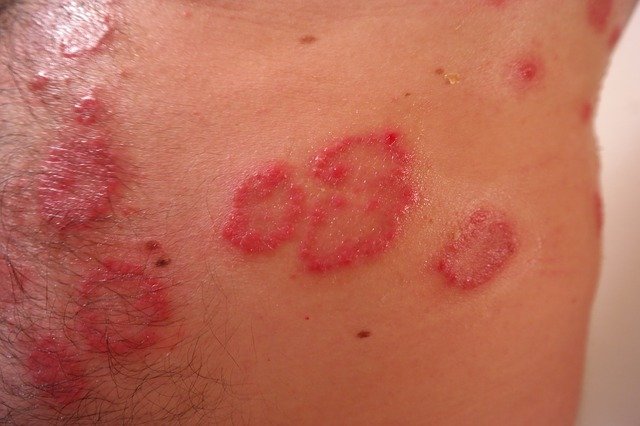
When you think of an autoimmune disorder, you may think of rheumatoid arthritis or multiple sclerosis (MS), but autoimmune diseases can strike the skin, too.
Below we’ve got six common autoimmune diseases that either affect the skin directly, or cause symptoms on the skin.
What is an Autoimmune Disease?
An autoimmune disease is any disease in which the immune system attacks the body. Usually, the immune system protects us from bacterial and viral infections, but sometimes, it can get its wires crossed, and attack bodily tissues instead. In rheumatoid arthritis, for example, the immune system mistakenly attacks the joints, causing inflammation and pain.
Some autoimmune diseases cause the immune system to attack the skin, and some create symptoms on the skin as a side effect of the disease.
7 Types of Autoimmune Diseases that Affect the Skin
Below are six of the most common autoimmune diseases that affect the skin.
- Psoriasis: In this disease, the immune system is “too” active, causing inflammation in the skin and stimulating cells to reproduce more quickly than usual. The result is a buildup of skin cells that create flaky, silver white patches known as “plaques.” The symptoms come and go, often triggered by things like stress, infections, medications, alcohol, or sun exposure. Some people also develop “psoriatic arthritis” along with their psoriasis, when the immune system starts attacking the joints, too.
- Systemic Lupus Erythematosus (lupus): Lupus is an autoimmune disease in which the immune cells attack healthy cells by mistake in various parts of the body, including the skin. About half of those suffering from lupus will develop a read rash across the cheeks and bridge of the nose in the shape of a butterfly. Rashes may also show up on the ears, arms, shoulders, chest, and hands. Sun exposure makes the flare-ups worse.
- Scleroderma: Also called systemic sclerosis, this is an autoimmune disease of the connective tissues in the body, which include the skin, joints, blood vessels, muscles, and more. Symptoms may include patches of thickened skin, often around the fingers and toes, and red splotches of skin. Waxy or shiny skin is also possible, often on the arms, legs, and forehead. So-called “localized” scleroderma is usually limited to one area, and is considered a mild condition. “Systemic” scleroderma causes symptoms throughout the body, and is considered more serious.
- Dermatomyositis: This is a rare condition in which the immune system attacks body tissues, particularly muscular tissue and skin. Skin may become violet-colored, or may develop dark red rashes, usually on the face and eyelids, or on the elbows, knuckles, knees, chest, and back. The rash can be itchy and painful.
- Epidermolysis bullosa: This is another rare autoimmune disorder that causes blisters to form on the skin. They may occur in response to an injury, high temperatures, or from rubbing and scratching. The skin feels fragile because it can blister so easily. There can also be thickened skin on the palms and the soles of the feet, and tiny white bumps or pimples (melia) may form. The blisters may also develop in other areas of the body, like the lining of the mouth and stomach.
- Bullous pemphigoid: One more rare disease, this one also causes blisters, but usually on the folds of the skin, like those in the upper thighs, armpits, or lower abdomen. The immune system attacks the thin layer of tissue just below the outer layer of skin. The blisters are large and easily rupture when you touch them. Eczema or rashes may also develop, and the skin may be itchy. Patients also may develop blisters in the mouth.
- Thyroid disorders: Hypothyroidism occurs when the thyroid doesn’t produce as much thyroid hormone as it should. One of the signs of this disorder is dry skin, dry hair, and dry, brittle nails. Patients may also experience puffy eyelids, and thickened skin on the lower legs. Hyperthyroidism occurs when the thyroid produces too much thyroid hormone, and this can result in moist skin and sweat rashes in the skin folds.
Talk to Your Doctor About Autoimmune Diseases
If you suspect you have any of the symptoms listed above, be sure to talk to your doctor right away. All of these conditions involve a problematic immune system, and there are medications that can help.
Beyond that, practice good skin care. Always protect from the sun, first and foremost. Then be extra gentle with skin, using only products that are safe and that don’t contain harsh chemicals. All of our CV Skinlabs products were made specifically for fragile skin. You can feel good about using any of them to help tame inflammation, soothe itching, and help skin repair itself. (See our “Skin Conditions” section for more information.)
Do you have an autoimmune skin condition?

